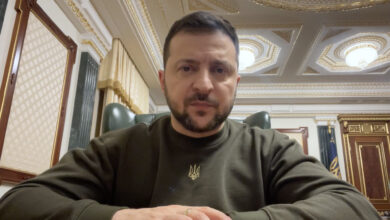Doctors usually have a lot of interesting stories to tell about their patients. And when it comes to high profile patients, like Presidents of the United States for instance, these stories could be a book. In The White House Doctor (Thomas Dunne, 2010) Dr. Connie Mariano shares her memories as the first military woman in the United States’ history to be appointed White House doctor. Al-Masry Al-Youm spoke to her about the nine years she spent in the White House, and the three U.S Presidents she treated: George H.W. Bush, Bill Clinton, and George W. Bush.
Al-Masry Al-Youm: How were you chosen to serve as a White House physician?
Dr. Connie Mariano: I was an active duty military (US Navy) physician and nominated to the White House position by the Navy and then selected by the White House from six candidates.
Al-Masry: As the first female director of the White House medical unit, what kind of challenges did you face?
Dr. Mariano: Fighting stereotypes about race and gender. I am Filipino by descent, and when people see a petite Asian woman, they don’t automatically think that I’m the White House doctor.
Al-Masry: What was your daily schedule at the White House? Did it include a daily check-up for the president?
Dr. Mariano: The daily schedule depended on what the President was doing that day. You accompany him to every major event, travel with him. Yes, we arranged an annual examination at our military hospital for him. We issue a press release/press conference after the physical exam.
Al-Masry: Do you provide medical care for the First Family and foreign visitors as well?
Dr. Mariano: All of the above. Our primary responsibility is the President. Then the Vice President. We also take care of the First and Second Families, even their pets, their dogs and cats. In addition to military, Secret Service and civilian staff assigned to the White House. We also provide health care for tourists should they become ill or injured on the White House compound. Occasionally we are asked to take care of visiting foreign dignitaries.
Al-Masry: Your patients were presidents. How did you deal with them as a doctor and catch their attention?
Dr. Mariano: Because they see you every day, they become comfortable with you and consider you almost as part of their “family.” Doctors must focus on their primary job, and that is to ensure good medical care all the time. But if the President doesn’t want to “listen,” often times we go to the First Lady to ask for her assistance in getting her husband’s attention.
Al-Masry: Could you tell us about your relationship with the First Ladies?
Dr. Mariano: It’s very positive and we are close. The First Ladies are in charge of the well being of their family. Any White House doctor must get the approval and blessing of the First Lady when it comes to advising the President and First Family in their health issues.
Al-Masry: You have a close relationship with three US presidents. How would you describe each one as a patient?
Dr. Mariano: George H. W. Bush was like “father figure,” the same age as my parents. Bill Clinton was like older brother; very energetic, charismatic. George W. Bush I didn’t spend much time with, but he was very athletic, in excellent health.
Al-Masry: In your book you write about the “kill zone.” Could you describe that for us?
Dr. Mariano: The vicinity around the President in which assassins tend to target the President. If you stand close to the President, you are in the “kill zone” and risk injury should a stray bullet miss the President and strike you.
Al-Masry: Why was the medical care extended to 24 hours during Clinton’s presidency?
Dr. Mariano: Clinton was a very active president who worked late hours, did lots of travel, and was often unpredictable. I felt it was safer to have 24-hour care and that that care also extended to the Vice President. So until this day, the President and Vice President have 24-hour medical coverage.
Al-Masry: What is the hardest situation you have faced during your nine years at the White House?
Dr. Mariano: Foreign travel and security concerns. On a trip to Morocco in 1999 with President Clinton for the King of Morocco’s funeral, we were concerned about the jet lag, heat, and large crowds with over one million mourners in the streets. It was almost pandemonium, a frightening scenario from a security stand point.
Al-Masry: And the funniest one?
Dr. Mariano: The funniest one was when the King of Spain flirted with me on his yacht and afterwards I almost accidentally flooded the bathroom on the yacht. I mention it in detail in my book.
Al-Masry: When you wrote the book, how did you draw the line between the privacy of the patient and the fact that your patient is a public figure that people want to know everything about?
Dr. Mariano: I had to balance between patient privacy and public’s right to know that their president is healthy. After I wrote the manuscript, I gave a copy to former President Clinton’s staff and they reviewed it.
Al-Masry: What about the other former presidents, did you give copies to President Bush (father and son) as well?
Dr. Mariano: The majority of the story involves President Clinton. The items I can discuss are those that have been issued before to the press or revealed by the President or First Lady in their own memoirs. As a doctor, I am bound to respect my patient’s confidentiality/privacy regarding specific intimate matters. But since they are public citizens, I can address those issues that are of historical knowledge. It is often a difficult balance between their privacy and the American public’s right to know the status of the president’s health.
Al-Masry: Did the Clinton staff have any comments about the book?
Dr. Mariano: They approved what was released in the book.
Al-Masry: During your service, you were asked to take the blood sample from President Clinton for DNA to use in connection with Monica Lewinsky. How did that make you feel, and how did President Clinton deal with that?
Dr. Mariano: Independent Counsel Ken Starr ordered me to draw the blood to get the DNA sample of Clinton to link him to Monica Lewinsky’s infamous blue dress. I had to follow the order since I was military. I was not happy doing so. I felt I was being used as a “pawn” against my patient. President Clinton was calm, business-like when I drew his blood in front of his attorney, an FBI agent, and one of Ken Starr’s assistants.
Al-Masry: Before any presidential election, should all nominees undergo a complete medical check?
Dr. Mariano: I would recommend that presidential candidates do undergo a complete physical and that their doctor submits a summary of their findings to the press.
Al-Masry: And in case a serious disease such as HIV has been discovered, is the President disqualified from carrying on in his job, or the candidate disqualified from running?
Dr. Mariano: Nothing has been written that would disqualify a candidate. It would be the concerns of the public if they thought their candidate would not survive a term in office or if they had a medical condition that would affect their mental ability to make decisions and lead the country.
Al-Masry: Is being a White House doctor a hard position?
Dr. Mariano: It is challenging, and can be very exhausting, even dangerous. But it is a tremendous honor to serve America in this way.




